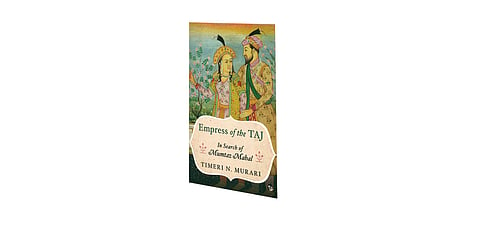
- Destinations
- Experiences
- Stay
- What's new
- Celebrating People
- Responsible Tourism
- CampaignsCampaigns
- SubscribeSubscribe
- Buy Now

Set in 1982, this book is a beguiling tribute to the memory of Arjumand Bano&mdashthe daughter of a nobleman, better remembered as Mumtaz Mahal in the vaults of history.
While travelling through India to research his bestseller (Taj A Story of Mughal India 1985), Murari becomes increasingly enamoured by the idea of Arjumand, the fragments of his imagination in a constant tussle of piece together, or pull away. The result is a rich blend of history and travelogue, one that attempts to peel off the protective veneer from the life of the Mughal queen. The author travels across Chennai, Delhi, and Agra for answers, finally halting at Arjumand&rsquos original resting place at Burhanpur.
A captivating record of bygone eras, the novel&rsquos prose is effortless, with no attempt at manufactured airs. As a reader, you feel the enthusiasm on Murari&rsquos dust-caked face you cautiously peer across his shoulder when stalled by a ticket collector, or when he gets stuck in the darkness of forested Jhansi you are weak-kneed beside his wife, Maureen, during her endearingly faint-hearted encounters with the chaos of India. As an aspiring writer, you note how Murari weaves in comedy, sarcasm and his own personality without diluting the purpose of his tale. Anecdotes from previous travels are offhandedly scattered throughout the text, as are refills of north Indian history&mdashseemingly in excess at the beginning, they make for valuable context in later chapters a leg-up of sorts, to reach the headspace at which Murari intends to piece together Arjumand. The author&rsquos perspective is (sometimes, obstinately so) of young scribe and muse&mdashwhile that proves useful in scavenging evidentiary poetry from the driest of relics, it takes restraint to not cross into the intoxication of forced personas. The cup of unbridled adoration does spill a drop or two of clichéd sentiment about sensuality and femininity, though, but it&rsquos nothing aggressive.
Nevertheless, I&rsquom not entirely convinced that Murari succeeds in humanising Arjumand as an arresting individual beyond the jaali-cloaked exoticism of an Indian empress. Nevertheless, his unwavering lens for her to persist as the focal point of this tale, no matter the stature of those beside her (&ldquoArjumand&rsquos husband, the Emperor Shah Jahan&rdquo), salvages the imperfect characterisation.
